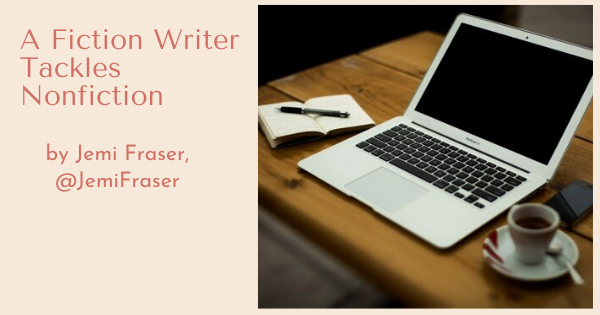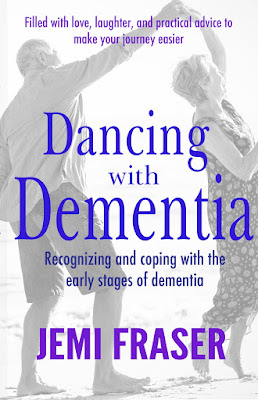by Jemi Fraser, @jemifraser
I am normally a fiction writer. I write romance, suspense, and flash fiction from a wide variety of genres. When our family was hit by dementia, I decided to tackle this new-to-us disease in writing in order to help other families facing those early stages of the disease.
Nonfiction and fiction share some similarities, but they are also different in many ways. I discovered that writing nonfiction is easier than writing fiction. It is also much more difficult.
Easier: the story is already there
Harder: the story is already there
Sure, the story is there, but (at least in the case of Dancing With Dementia) the story is life itself. The story is all parts of life intertwined in a big, jumbled mess of timelines and emotions and details.
Choosing which parts belong in a story that is to be shared with the world is the challenge. The parts you choose need to be interesting and connect to your theme and they need to showcase that theme while staying true to life.
Easier: the characters are real people
Harder: the characters are real people
In fiction, we create characters. We invest time and energy into creating characters who are as real as we can make them.
In my non-fiction work, the characters are fully evolved people complete with backstories, emotional investment in the story, flaws, and strengths. Putting those people on paper to share with the world involves all kinds of risks, both to the people in the story and to the author. Keeping an unbiased perspective on the characters (and yourself if you’re a character as well) is difficult but necessary.
Easier: audience is key
Harder: audience is key
If an author wishes to sell, it’s important to keep the audience in mind. Who is the target audience? Why will they want to read the book? What do they want from the book?
Fiction tend to focus on entertainment. Nonfiction (in this case anyway) focuses on a blend of information and entertainment. Even informational texts should be entertaining enough to keep the audience reading.
Knowing what parts of our experiences would help the audience and entertain them at the same time was a challenge. In the end, some of our stories involving Mom didn’t make the cut for the book because they weren’t sufficiently entertaining or informative.
So how do we switch our brains from fiction to nonfiction mode (or nonfiction to fiction)?
For me it’s all about character and emotion. No matter what I’m writing, I need to put myself in the head of the character.
For Dancing With Dementia, it wasn’t hard to slip into my concerns about Mom as those concerns were never far from the surface.
How about you? Any other thoughts to add about the difference between fiction and nonfiction? When you read nonfiction, do you want to be both entertained and informed?
A Fiction Writer Tackles Nonfiction (by @JemiFraser) : Click To Tweet
Fraser’s DANCING WITH DEMENTIA,
Recognizing and Coping with the Early Stages of Dementia Blog Tour
through MC Book Tours today.
Gift Card. More information on the giveaway is listed below.
by Jemi Fraser
◊ Publisher: Just Jemi Books
◊ eBooks
◊ ISBN-13: 978-1-9991258-1-3
world, but so much is still unknown.
the early warning signs. We didn’t know the differences between regular aging
and the early stages of dementia. We’ve made mistakes but we’ve learned a lot.
WITH DEMENTIA will help you:
•Identify those early warning signs
•Use visuals to improve communication
•Choose your words wisely
•Redirect and reassure
•Stay calm and cope with your own emotions
•Consider nursing home options
•Improve caregiver self-care
disease with our love and laughter intact. If you are looking for help
recognizing early signposts along with practical ways to cope with early
Dementia and Alzheimer’s, this book is for you.
DANCING
WITH DEMENTIA buy
links:
Amazon.com Amazon.ca Apple Books
Barnes & Noble Kobo
who aren’t familiar with the author, here’s a bit of background on her.
 Jemi Fraser
Jemi Fraserwrites both fiction and nonfiction. Her nonfiction work focuses on the ways
that dementia has impacted her family. Her fiction work varies from
contemporary romance to suspense and flash fiction. Years as a teacher have
taught Jemi that life is short and that happy endings are a must.
in Northern Ontario, Canada where snow is always a topic of conversation and
the autumn leaves make everything better.
Jemi and her writing, visit her following sites:
tour-wide giveaway is for a $20 Amazon Gift Card. The giveaway is
open internationally.
giveaway, just click on the Rafflecopter widget below and follow the
instructions. The widget may take a few seconds to load so please be patient.
If the widget doesn’t show up, just click HERE and
you’ll be directed to the widget.
stopping by and be sure to follow Jemi on her week-long tour HERE. You never know what you
might find out. I hope dementia hasn’t touch your family or friends, but in
case it has do you have any tips to share on dealing with this terrible
disease?
Photo on Visualhunt.com



What an excellent way to deal with a personal hardship and to help others.
Thanks, Elizabeth! I’m hoping the book can make life easier for people dealing with those early stages!
Very true – the story is there, but you have to pick the right parts. You have to stick to the truth rather than completely change the story line.
Thanks so much for posting today, Jemi! I’ve always been hesitant to try non-fiction because of the learning curve, so you’re an inspiration. :) I thought you did an amazing job telling your mom’s story.
I couldn’t agree more about the differences between writing fiction and writing non-fiction. I write non-fiction in my ‘day job’ – mostly academic writing. I also write crime fiction. There are a lot of similarities and differences, and negotiating them can be a challenge. Thanks for sharing your insights.
Jemi, thank you for writing your story. Being someone who has dealt with dementia, I feel your book will be very helpful to others dealing with this terrible disease.
Elizabeth, thanks for being a part of Jemi’s tour.
Thanks so much for hosting Dancing With Dementia today, Elizabeth! I truly appreciate all of your support!
Elizabeth Se – thank you! I sure hope it helps others!
Alex – picking those parts was sometimes pretty tough!
Elizabeth SC – thanks again! Nonfiction is a lot more fun than I expected. Hope you try it out!
Margot – thank you! I bet you can feel your brain ‘shift’ into each mode of writing!
Mason – thanks so much for everything!
Congrats, Jemi!
Whenever you’re dealing with real people, you have to be very careful what you write.
I see your point, but you traversed the difficulty well. Thank you so much for sharing your journey will all of us. You answered so many questions that I didn’t even know I had!
Elizabeth, thanks for having Jemi today. Jemi, thanks for sharing some of your experience is tackling this book. I’m sure it will be a help to so many. Thank you.
Diane – exactly! Although our whole family just said “write the truth”
Renee – thank you! It’s a tough journey and we learned SO many things we’d never considered!
Denise – thanks! Writing the book was definitely difficult at times, but so worth it!
Hi,
I read fiction and non-fiction. In non-fiction, my most enjoyable books are those that are written creatively. You have done an awesome job of putting facts together that draws the reader in. You had me captivated by the first two pages. I didn’t want to put the book down.
Shalom aleichem,
Pat Garcia
Wow – thanks for the kind words, Pat! I’m so glad our story has managed to make an impact!!